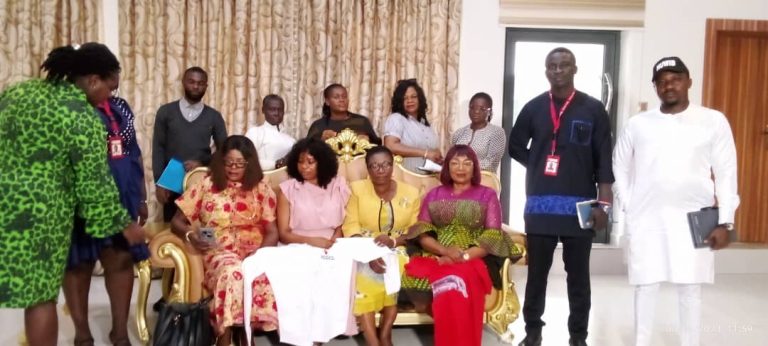By Musa Yaro, Calabar
Save the Children International, Ogoja Field Office, has sought the support and partnership of the wife of Cross River State governor, Rev. Eyoanwan Bassey Otu, to create awareness of the use of reusable sanitary pads among women in rural communities.
This, the group noted is in recognition of her passion and commitment to improving the living conditions of Cross Riverians including those living in rural areas.
Water and Sanitation Hygiene Officer, Save the Children International, Ogoja Field Office, Ms. Grace Awoyemi, while speaking during the visit said that the purpose of the visit was to discuss menstrual hygiene management in the state with a focus on the promotion of use or reusable sanitary pads among women in the state.
“We understand that people from homes that are below average find it difficult monthly to buy disposable sanitary pads. Hence, we found a way to devise a project whereby women and adolescent girls can be trained on how to produce reusable sanitary pads as a solution to this gap.
“We have been able to so far trained about 130 women and girls from both the host communities surrounding the refugees’ settlements and the refugees. These have been able to commence production since 2020 and it has not been known outside Ogoja and Benue State.
“We are here to raise awareness about it and see how government can support this empowerment and sustainability of menstrual hygiene. “Disposable pads create more waste and reusable pads as a substitute, reduce waste,” Awoyemi explained.
She maintained that adopting the use of reusable pads is a way of creating an environment-friendly state.
Awoyemi remarked that the reusable sanitary pads are made from cotton materials that are absorbent and skin-friendly, adding that there is a need for government to create policies that will encourage safe space for women to change during their monthly period.
Special Adviser, Administration, Office of Wife of the Governor, Dr. Comfort Oko, on her part, commended the organization for the initiative.
“If an organization like this is picking it up to say it is the right thing when you do not have the means to buy, I think it makes it more acceptable.
“The awareness on the use of reusable sanitary pads will help curb the problem of inferiority complex among teenage girls who feel looked down upon for using reusable pads.
“It is a noble idea that is sustainable for women from low-income families who do not have the means to buy disposable pads,” the aide stated.
Special Adviser, Programmes, Projects and Events, Office of Wife of the Governor, Dr. Inyang Asibong, added that considering how expensive commodities are to the purchasing power of some people, reusable pads are particularly for those that cannot afford the disposable sanitary pads.
“This initiative is a more sustainable way and it is helping with the hygiene of young girls particularly those who may not have money to buy disposable pads.
“The wife of the Governor is doing so many interventions for young people, older people and all.
We will need you to support us with disposable sanitary pads so that we can share during these interventions and explain to them how it is used because it is important and sustainable, particularly in the rural areas that need it more,” Asibong said.
Earlier, the Advocacy and Communication Assistant, Save the Children International, Ogoja Field Office, Mr. Omede Samuel Eyimofe, informed that in line with their mandate, Save The Children International has been able to provide education for children regardless of their race, gender, or where they hail from.
He stated that they are currently running an intervention for Cameroonian refugees and host communities in Cross River, Benue, Taraba, and Akwa Ibom States.
Explaining the operations of Save the Children International, Eyimofe solicited for government presence in their humanitarian interventions through the Office of the Wife of the state government, extending the invitation of the organization for the World Humanitarian Day celebrated August 19, annually.
The visit advanced into an interactive session with the team from Save the Children International, Ogoja Office, on government policies that can integrate menstrual hygiene education in schools and communities as well as promoting reusable sanitary pads among women in the state.


